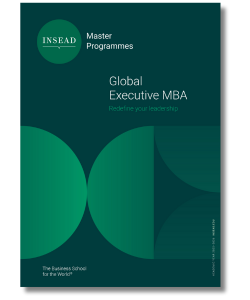Executive MBA (EMBA) Programme
The content and curriculum of an Executive MBA is quite similar to an MBA, however, typically there will be more emphasis on individual leadership development. This is because the Executive MBA is tailor-made for participants who are at a more advanced stage of their career as compared to MBA students.
At INSEAD, Executive MBA participants have at least three years of managerial experience with a total of 13 years of work experience on average, with the average age being 37 years.
Executive MBA participants can expect to be in a peer group of other, highly motivated and successful managers looking to formalise their knowledge of general management and fine-tune their leadership skills to take the next step in their career, typically not looking for a major change in their professional direction.
At INSEAD, we have developed a whole Leadership Development Programme integrated in the EMBA curriculum which is often described as one of the most impactful aspects of the EMBA experience. The Executive MBA programme structure is adapted to the needs of the participants, balancing work and study, so classes would typically take place in the evenings, at weekends or as modules over a longer stretch of time (i.e. not full-time on campus). INSEAD’s Global Executive MBA is taught in a modular format in a compact 14-17 months.
Similar to full-time MBA programmes, admission to an Executive MBA programme often requires taking a standardised admissions test, a written application form with essay questions and professional recommendation letters as well as an interview.
INSEAD’s EMBA programme offers the choice between taking the in-house EMBA Assessment, GMAC Executive Assessment (EA) or the GMAT. See here for the other EMBA admissions criteria.
MBA Programme
In general, it can be said that the MBA is targeted at young professionals who are at an early stage in their career. Typically, they are identified as high performing individuals in their specific domain, and are now looking to broaden their perspectives, learn more about general management and make some change in their professional direction, be it role, industry, work country or all three of these aspects. MBA students may or may not yet be in a managerial position.
At INSEAD, the average age in the MBA class is 29 years (ranging between 23 and 37) with five years’ work experience (ranging between two and 10 years). Our employment statistics regularly show more than 80% of graduates changing some aspect of their career after completing the programme, and indeed many companies offer management positions or management acceleration tracks specifically created for MBA graduates. This is also why there is extensive career development support for MBA participants. At INSEAD, career development support starts in the first week of the programme and follows all the way through till graduation and beyond.
MBA programmes can be taught full-time on campus (typically one, one and a half or two year programmes) or part-time as evening or weekend classes over a longer stretch of time. The curriculum covers all aspects of business, ranging from finance to marketing and organisational behaviour and beyond. After having completed a compulsory core course curriculum, students can delve deeper into specific areas of interest through elective courses or the opportunity to major in one more subjects. Take a look at INSEAD’s 10-months full-time MBA curriculum here.
In terms of admissions, most MBA programmes require applicants to take a standardized business school admissions test such as GMAT, as well as submitting an application form with essays and professional recommendation letters. Typically, if a candidate is shortlisted based on their written application the next step would be a formal interview. Each school has their own way of evaluating a candidate, see here for INSEAD’s MBA admissions criteria.







